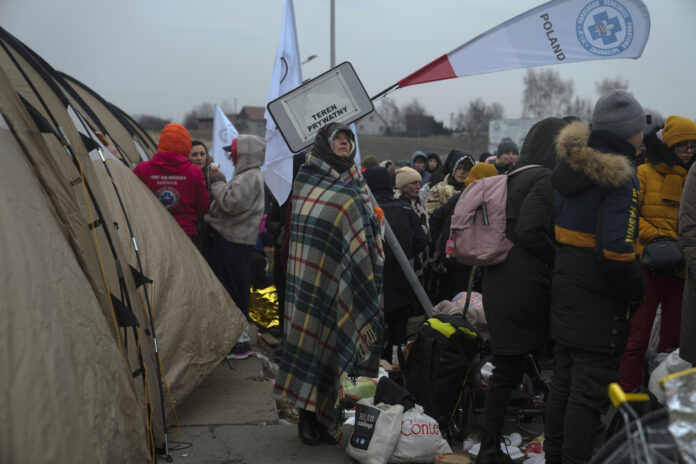Masouma Tajik fled Taliban rule in Afghanistan in August, leaving her life and family behind at only 22 years old, carrying just one backpack.
Last week, she left the new life she had built for herself over the past six months in Ukraine with only that same backpack in hand.
“I was so sleepless and tired and I was just looking for a way to get out of Lviv, to get to the border,” she said.
Afraid to spend what little money she had on food and exhausted after several sleepless nights, Tajik made her way to Poland with the help of volunteers, under the terrifying din of air-raid sirens.
Her escape from Lviv, Ukraine to Warsaw, Poland bore ghastly similarities to her flight from her home in the Herat province of Afghanistan months earlier.
The Canadian government is allowing Ukrainians who have fled Russian aggression to come to Canada temporarily for a period of two years “for those who need a safe haven while the war ravages their homeland,” Immigration Minister Sean Fraser announced last week.
It’s the kind of program Tajik said she hopes to see from Canada and other countries in response to the crisis in Ukraine.
“I just need legal status, I just need a pass so that I could get somewhere stable,” said the now 23-year-old data scientist in an interview.
Providing aid to Ukrainians fleeing conflict
But Canada’s program would not apply to her. The immigration minister’s office says for now, the program is only available to Ukraine citizens.
Non-citizens will still be given priority status if they apply to come to Canada through other immigration streams.
Several advocates and experts say nationality should not be a consideration when helping people to flee violence.
“I think we’re also seeing a large number of temporary residents and non-Ukrainian citizens who are being impacted by this,” said Will Tao, a British Columbia based immigration and refugee lawyer.
Trending Stories
Putin miscalculated if he thinks West will move on after Ukraine invasion: ambassador
In 2-day spree, 61K users book Airbnb stays in Ukraine with no plans to go
Read more:
Black immigrants fleeing Ukraine outline challenges to cross borders, gain refugee status
He said the same would apply to the hundreds of Afghan refugees who escaped to Ukraine last year, only to find themselves in yet another war zone.
“I’m hoping that our policy isn’t strictly limited to citizenship, that residents in Ukraine prior to this can also factor in, and that we can accommodate some of those folks,” he said.
The Canadian Council for Refugees said refugees who resided in Ukraine are in an extremely vulnerable situation now.
“Their situation is even more precarious,” said executive director Janet Dench. “We’re certainly calling on the government to pay particular attention to to them,” especially as early reports indicated some refugees and temporary residents in Ukraine experienced racism at the border and extra difficulty leaving the country as Russia attacked.
In a statement, the immigration minister’s office said all policy decisions are made with safeguards in place to protect against bias and ensure accessibility for those who need it.
Refugee of colour faces discrimination while fleeing country
Other countries are experiencing similar dilemmas about how to manage what has now been deemed Europe’s fastest growing refugee crisis since the Second World War.
The United Nations Refugee Agency, UNHCR, said 1.5 million people have fled the country so far.
Last week, European Union ministers voted unanimously to activate The Temporary Protection Directive for the first time since it was created in 2001.
UNHCR said the directive means member states will provide immediate protection for Ukrainians and third country nationals with refugee or permanent residence status in Ukraine.
People without citizenship or long-term status in Ukraine are largely racialized minorities, said Juliana Wahlgren, a member of the European Commission’s expert group on migration, Integration, and asylum.
Often they are asylum seekers who are still waiting to be granted safety, students, and people with short-term work visas. Some of those people are not able to return to their home countries.
“If you have to provide protection based on the massive influx (of displaced people) and the risk of harm, they should be applied for anyone coming from that situation, not based on the nationality,” said Wahlgren, who is also the acting director of the European Network Against Racism.
Much like Canada, the EU’s decision to offer a temporary safe haven to people displaced by the conflict is a good one, Wahlgren said.
“What is bad is the double standard,” she said.
The UNHCR has urged countries to take an inclusive approach and grant the same safety and security to everyone fleeing Ukraine.
For Tajik’s part, she said when she was in Ukraine she tried to put her struggle in Afghanistan behind her and focus on her future. Now, after a second harrowing escape from another dangerous country, she’s realized she’s simply tired of war.
“We are starting from zero again,” she said.
She hopes countries will extend opportunities to Afghans and others who’ve escaped with their lives, and allow them to rebuild from the beginning again.
© 2022 The Canadian Press



